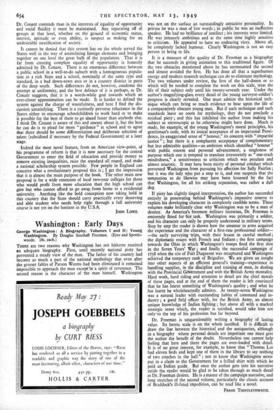Washington: Early Days
THERE are two reasons why Washington has not hitherto received an adequate biography. First, until recently national piety has prevented a steady view of the man. The father of his country had become so much a part of the national mythology that even after the grosser fables of Parson Weems had been eliminated it remained impossible to approach the man exceprin a spirit of reverence. The second reason is the character of- the man himself. Washington
was not on the surface an outstandingly attractive personality. In private he was a man of few words ; in public he was an ineffective speaker. He had no brilliance of intellect ; his interests were limited. He was intensely ambitious and at the same time highly sensitive to criticism. He appeared to have no endearing vices. Above all, he completely lacked humour. Clearly Washington is not an easy person to bring to life.
It is a measure of the quality of Dr. Freeman as a biographer that he succeeds in giving animation to this traditional figure. Of the two obstacles mentioned above he has surmounted the second and almost avoided the first. He has done all that a superhuman energy and modern research technique can do to eliminate mythology. The two volumes under review, the first of the half-dozen or so which will be needed to complete the work on this scale treat the life of their subject only until his twenty-seventh year. Under the author's magnifying-glass every detail of the young surveyor-soldier's progress is clearly revealed. One must admire the historical tech- nique which can bring so much evidence to bear upon the life of a comparatively obscure young man. But if such technique and such standards leave no room for mythology, they do not preclude a residual piety-; and this has inhibited the author from making his subject as stereoscopic as he. otherwise might have done. Much is made, for example,- of the young Washington's moral principles, his gentleman's code, with its stoical acceptance of an impersonal Provi- dence, its exaggerated sense of "honour," its concern with -" impartial justice " ; but there is a complacent acceptance of complementary but less admirable qualities—an ambition which identified " honour " with public esteem and personal advancement, a singleness of purpose which one is-tempted to translate irreverently as "one-track mindedness," a sensitiveness to criticism which was petulant and almost neurotic. It may have been nicety of personal cotiduct which prevented Washington from pursuing his affection for Sally Fairfax ; but it was the lady who put a stop to it, and one suspects that the temptation to do likewise may have been lessened by the fact that Washington, for, all his striking reputation, was rather a dull dog.
If piety has slightly tinged interpretation, the author has succeeded entirely in penetrating behind Washington's impassive reserve to explain his developing character in completely credible terms. These volumes make brilliantly clear why Washington was to be a man of destiny. As America's foremost military historian, Dr. Freeman is eminently fitted for his task. Washington was primarily a soldier, and his character can only be properly understood in military terms. Step by step the reader is shown how the amateur in arms acquired the experience and the character of a first-rate professional soldier- -the early surveying -trips, with their lesson in careful method ; the diplomatic essays with French and Indians ; the first campaign towards the Ohio in which Washington's troops fired the first shot in the Seven Years' War;. and finally the successful campaign of 1758 when the site of Fort Duquesne was recaptured and Washington achieved the temporary rank of Brigadier. We are given an insight into other aspects of an efficient general's training—experience in handling supplies, in the discipline and training of men, in dealing with the Provincial GOvernment and with the British Army mentality. Hard work, hard riding and attention to detail are the chief morals of these pages, and at the end of them the reader is left convinced that he has learnt something of Washington's quality ; and what he has learnt he wholeheartedly admires. At twenty-seven Washington was a natural leader with outstanding habits of command and in- dustry; a good field officer with, for the British Army, an almost unique knowledge of Indian fighting ; but above all with a marked strategic sense which, the reader is satisfied, would take hint not only-to the top of his profession but far beyond.
Dr. Freeman is unquestionably writing a biography of lasting value. Its heroic scale is on the whole justified. It is difficult to draw the line between the historical and the antiquarian, although in a biography where personal details are important one must give the author the benefit of the doubt. Nevertheless one cannot help feeling that here and there the pages are over-loaded with detail. It is of no great interest, for example, to know that "-Thomas Lee had eleven beds and kept one of them in the library to say nothing of two couches in the hall " ; nor to know that Washington never put in a claim to the Government for a frilled shirt with which he paid an Indian guide. But once the author gets into his narrative stride the reader would be glad to be taken through as much detail as Dr. Freeman desires. He is a master of the campaign narrative, and long stretches of the second volume, particularly the classic account of Braddock's ill-fated 'expedition, can be read like a novel.
FRANK THISTLETHWAITE.






































 Previous page
Previous page